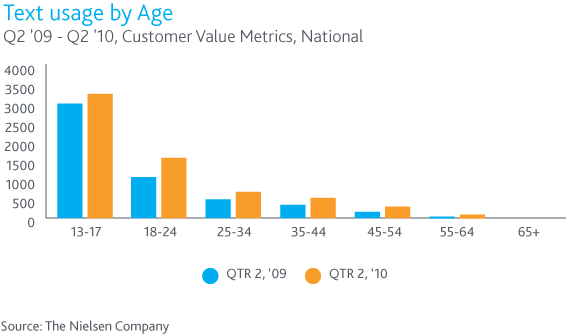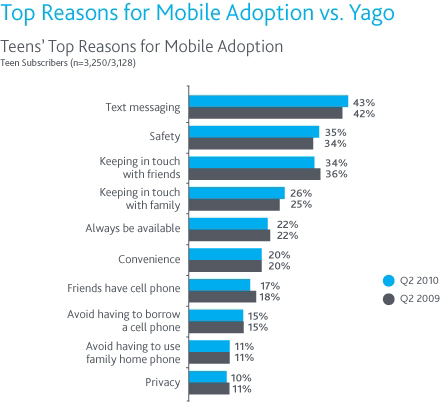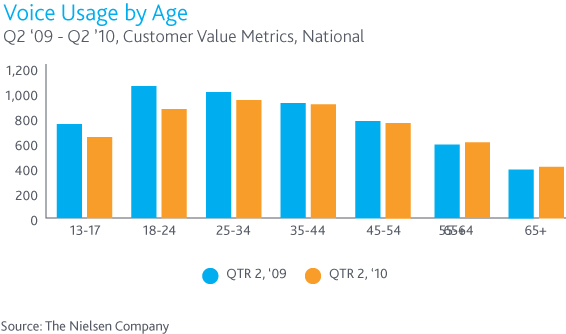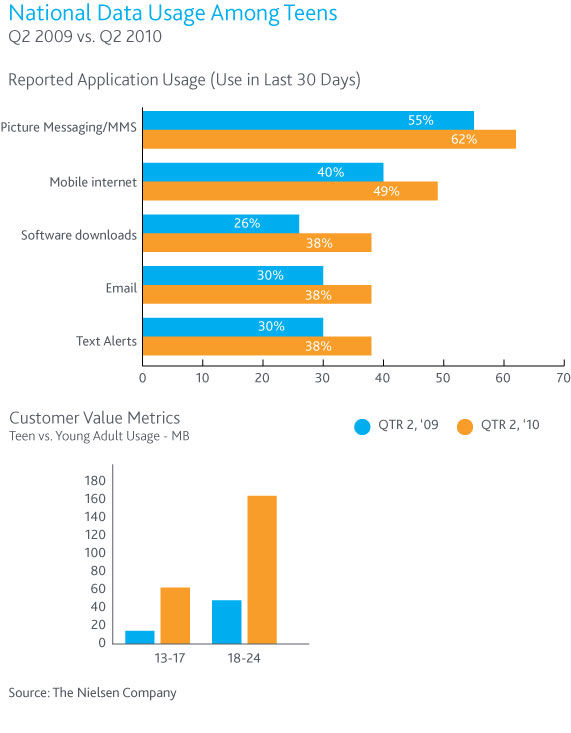If it seems like American teens are texting all the time, it’s probably because on average they’re sending or receiving 3,339 texts a month. That’s more than six per every hour they’re awake – an 8 percent jump from last year. Using recent data from monthly cell phone bills of more than 60,000 mobile subscribers as well as survey data from over 3,000 teens, The Nielsen Company analyzed mobile usage data among teens in the United States for the second quarter of 2010 (April 2010 – June 2010). No one texts more than teens (age 13-17), especially teen females, who send and receive an average of 4,050 texts per month. Teen males also outpace other male age groups, sending and receiving an average of 2,539 texts. Young adults (age 18-24) come in a distant second, exchanging 1,630 texts per month (a comparatively meager three texts per hour).

Number One Reason for Getting a Phone? It’s Not Safety Anymore
Texting is currently the centerpiece of mobile teen behavior. 43 percent claim it is their primary reason for getting a cellphone, which explains why QWERTY input is the first thing they look for choosing their devices. Safety, which was the main reason for getting a phone in 2008, is now less important – it is secondary among girls and less so among boys. Keeping in touch with friends is still one of the top three factors, too.

Texting is Easier and Faster than Voice Calls
All of this texting activity has come at the expense of voice. Last year, teens texted instead of calling because it was fun. Now, 78 percent of teens recognize the functionality and convenience of SMS, considering it easier (22 percent) and faster (20 percent) than voice calls (though still fun). Voice activity has decreased 14 percent among teens, who average 646 minutes talking on the phone per month. While voice consumption rises and peaks at age 24, only adults over 55 talk less than teens. Teen females, who are more social with their phones, average about 753 minutes per month, while males use around 525 minutes.

Data and Apps are Rising Stars
The undeniable area of growth is in data usage. 94 percent of teen subscribers self-identify as advanced data users, turning to their cellphones for messaging, Internet, multimedia, gaming, and other activities like downloads. While teen usage does not reach levels of activity seen by young adults, it has increased substantially versus Q2 last year, from 14 MB to 62 MB. This fourfold increase is the largest jump among all age groups. Much of this boost is led by males, who are more gadget-savvy and consume 75 MB of data, versus 17 MB in Q2 last year. Teen females use about 53 MB of data, compared to 11 MB a year ago.
Teens are not only using more data, but they are also downloading a wider range of applications. Software downloads among teen subscribers who use apps enjoyed a solid 12 percent increase in activity versus last year, from 26 to 38 percent. This includes popular apps such as Facebook, Pandora or YouTube. Usage of the mobile web has also surpassed activity on pre-installed games, ringtone downloads and instant messaging, too. Other mobile activities like mail and text alerts have also seen significant growth.



